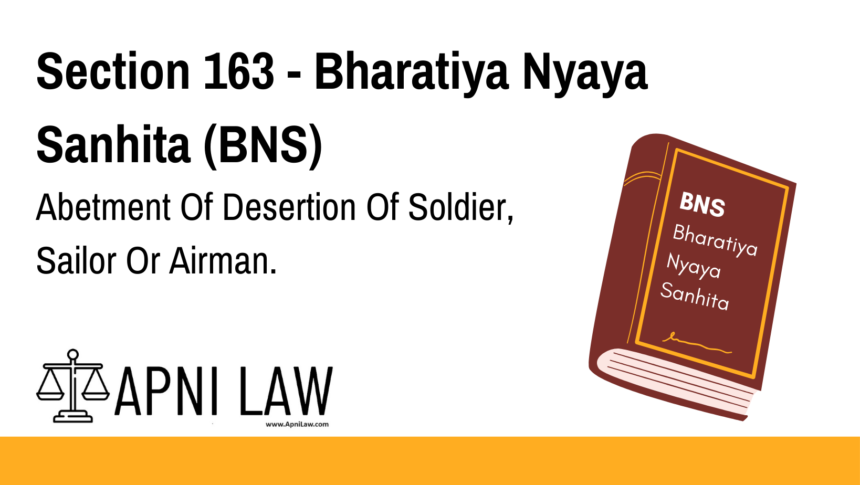Code: Section 163 BNS
Whoever abets the desertion of any officer, soldier, sailor or airman, in the Army,
Navy or Air Force of the Government of India, shall be punished with imprisonment of either
description for a term which may extend to two years, or with fine, or with both.
Explanation of Section 163 BNS
1. What is Desertion?
- Desertion refers to a soldier, sailor, or airman abandoning his post without authorization and with no intention of returning.
- It is a serious offense in military law as it affects national security and military discipline.
2. What Constitutes Abetment Under This Section?
A person is guilty under Section 163 BNS if they:
- Encourage or assist a soldier, sailor, or airman to desert.
- Provide resources (such as shelter, money, or false documents) to help in desertion.
- Instigate military personnel to leave their duty permanently.
3. Punishment Under Section 163 BNS
- Imprisonment up to 2 years (either rigorous or simple).
- Fine as determined by the court.
- Both imprisonment and fine in certain cases.
Illustration
Example 1: A Civilian Helps a Soldier Escape
A civilian arranges transport and a hiding place for a soldier who plans to desert his duty. Since the civilian has actively aided desertion, he is liable under Section 163 BNS.
Example 2: A Friend Encourages a Navy Officer to Quit Without Permission
A friend convinces a Navy officer to leave his post without approval and escape to another state. If the officer deserts, the friend is punishable under Section 163 BNS.
Common Questions and Answers on Section 163 BNS
1. What if the desertion was not completed?
Even if the soldier, sailor, or airman does not successfully desert, the person who abetting the act is still guilty under Section 163 BNS.
2. Can military personnel be punished under this section?
Yes, if a military officer or personnel encourages desertion, they can be charged under this section along with military laws.
3. What if the accused was unaware of the desertion plan?
To be convicted, the prosecution must prove that the accused intentionally abetted the desertion. If there was no knowledge or intent, the person may not be liable.
4. Is helping a deserter after the act also covered under this section?
No, helping after desertion is a different offense. Section 163 BNS applies only to those who aid before or during the desertion.
5. Is desertion different from absence without leave (AWOL)?
Yes, AWOL (Absence Without Leave) is temporary and usually results in disciplinary action, whereas desertion is a permanent abandonment of duty, which is a criminal offense.
Conclusion
Section 163 BNS is designed to prevent and penalize any act of abetment that leads to the desertion of military personnel. It upholds military discipline and national security by ensuring that no one encourages or assists soldiers in abandoning their duty.
For expert legal insights, visit ApniLaw today! 🚀








